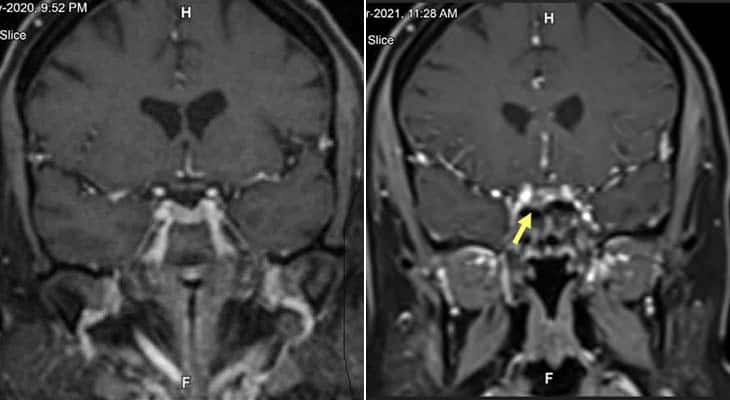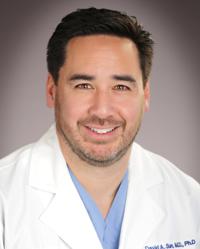The patient underwent bilateral inferior petrosal sinus sampling, and results confirmed a pituitary localization with elevated ACTH.

The patient
A 48-year-old woman presented with a history of morbid obesity (376 pounds, BMI 66 kg/m²), hypertension (142/80 on multiple antihypertensive medications), uncontrolled diabetes mellitus (hemoglobin A1C of 9.1), worsening fatigue and increasing facial hair.
Cushing’s syndrome is characterized by abnormally elevated levels of cortisol and causes symptoms of obesity, hypertension, hyperglycemia, hirsutism, thin skin and muscle wasting. Cushing’s disease is defined as cortisol elevation secondary to adrenal gland stimulation by an adrenocorticotropic hormone (ACTH)-secreting pituitary adenoma. Endocrinology evaluation is necessary to evaluate for an ACTH-dependent cause of hypercortisolemia. Dedicated pituitary MRI scans are required to visualize pituitary tumors.
In this patient, endocrinology evaluation demonstrated an ACTH level of 134.9 and an abnormally elevated 24-hour free cortisol consistent with Cushing’s syndrome. An MRI failed to clearly demonstrate a pituitary tumor.

Preoperative MRI scans demonstrate no clear evidence of a pituitary abnormality.
The challenge
An ACTH-secreting pituitary adenoma may be too small to visualize on MRI. In this situation, bilateral, inferior petrosal sinus sampling is required to confirm that the source of abnormally high ACTH is from within the pituitary gland versus a nonpituitary ACTH secreting tumor. Blood samples are taken from the right and left inferior petrosal sinuses in close proximity to the pituitary gland. These right and left “central” blood samples are compared to “peripheral” blood samples from the arm before and after the administration of ACTH secretion-stimulating medication (corticotropin-releasing hormone or desmopressin).
The physicians
 David A. Sun, M.D., Ph.D., neurosurgeon with the Norton Healthcare Brain Tumor Center and medical director, Norton Neuroscience Institute
David A. Sun, M.D., Ph.D., neurosurgeon with the Norton Healthcare Brain Tumor Center and medical director, Norton Neuroscience Institute Tom L. Yao, M.D., endovascular neurosurgeon, Norton Neuroscience Institute
Tom L. Yao, M.D., endovascular neurosurgeon, Norton Neuroscience Institute Jonathan S. Sagum, M.D., endocrinologist, Norton Community Medical Associates – Endocrinology
Jonathan S. Sagum, M.D., endocrinologist, Norton Community Medical Associates – EndocrinologyThe solution
The patient underwent bilateral inferior petrosal sinus sampling, and results confirmed a pituitary localization with elevated ACTH at baseline, two, five, 10 and 15 minutes after stimulation, as well as a possible right-sided lateralization.
| Baseline | +2 min | >+5 min | +10 min | +15 min | |
| Peripheral | 83.3 | 89.4 | 93.8 | 101.2 | 106.6 |
| Left IPS | 100.1 | 106.4 | 114.3 | 121.0 | 119.7 |
| Right IPS | 1279.0 | 1513.0 | 1447.0 | 701.9 | 619.8 |
| ACTH levels (pg/ml) from the peripheral blood, right inferior petrosal sinus (RIPS) and left inferior petrosal sinus (LIPS) at baseline, two, five, 10 and 15 minutes after stimulation. The marked elevations in right inferior petrosal samples in comparison to the left inferior petrosal sinus and peripheral blood confirm a central pituitary source and suggest right-sided lateralization. | |||||
She then underwent endoscopic transnasal transsphenoidal surgery. In the operating room, a small lesion along the right side of pituitary gland was identified and removed. Final neuropathology confirmed a pituitary adenoma with ACTH expression.
The result
Four months after surgery, the patient’s ACTH level is normal (15.4, down from 134.9). She lost 60 pounds, with a BMI dropping to 54 from 66. Her blood pressure is 130/76, and she has been weaned off antihypertensive medications. Her glucose intolerance has improved, with a recent hemoglobin A1C of 7.1, down from 9.1. MRI scan demonstrates postsurgical changes with subtle evidence of the resection cavity.

Postoperative MRI scan demonstrates evidence of resection along the right aspect of the pituitary gland.
Treatment and results may not be representative of all similar cases.
Refer a patient
Use Norton EpicLink to quickly and easily refer a patient to Norton Healthcare Brain Tumor Center.

